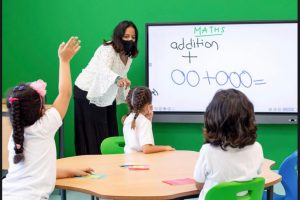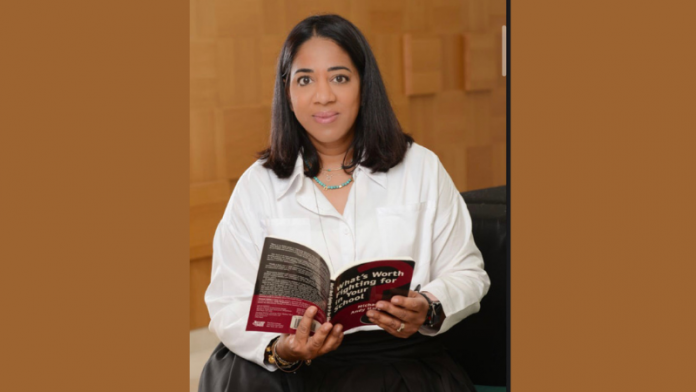Kamilya AlLamki, Principal, New World International School firmly believes that the role of educationists and teachers is to act as the spark that ignites and kindles the child’s innate quest for learning. Mayank Singh reports
-An OERLive Exclusive
Can you give us a brief background of your education and professional career?
My parents are both doctors, they are kind and brilliant souls who have dedicated their lives to helping people. Both parents grew up in Africa yet met at Medical School in Ireland. They then went onwards to Canada where they practiced as doctors and had three children. Our family lived in Canada for 10 years and then moved to Houston, USA. Given the medical background of my parents, we as the proud children of our parents assumed medicine was the career for each one of us. After graduating high school, I went into a pre-med program at Houston Baptist University. After completing my third year of pre-med my father got me into a six-week hospital internship program. The experience proved to be an emotionally overwhelming experience as I was plagued with guilt at the thought, I was healthy whilst the patients undergoing treatment were not. Despite the fact that I was helping and assisting them to recuperate. Shaken by the experience, I told my parents that I could not pursue medicine. To my pleasant surprise, they supported me in my decision not to pursue medicine and encouraged me to explore to find my passion. At the time I was at a loss for direction. I had no idea where to turn. My now husband Amrou asked me about what interests me? What sparks my soul? What did I look forward to doing? ‘I love tutoring high school students. I get great satisfaction when the light bulb goes on once someone understands the concept that is being explained.’ Amrou stated, “It is simple then, become a teacher.” My first reaction was, “that is never going to happen!” I narrate this anecdote because though I grew up in a household where education was very important, I was still predisposed to think that becoming a teacher was not a good enough career. This inherent bias reflects society’s outlook on teaching as a profession. I decided to try an educational class and fell in love. I went on to obtain my teaching degree and taught science and mathematics in the Austin Independent School District (AISD) to students in grades 6-8. Subsequently, I was chosen to be a part of a Leadership program and attended a two-year master’s program at the University of Texas in Austin to obtain my master’s degree in Educational Leadership and Administration. During my two years at the university, I got an opportunity to work as an assistant superintendent of Middle Schools. As part of the job, I, along with the superintendent were tasked with looking after 17 Middle Schools in the district. We worked closely with the principals of these schools to improve quality standards. Learned how to have those crucial conversations with administration, parents, and communities as a whole. I moved on to become the Vice Principal of a high-performing middle school of 2,000 students and then as the principal of an elementary (primary) school in Austin, Texas.
You had a promising career in the US, what led you to return to Oman and how has the experience been to date?
My husband, an Omani, has always known he wanted to give back to the community. In 2004, being an entrepreneur and living in Austin, Texas for 10 years, getting both his bachelors and master’s degrees and the tools needed to build a strong company that would build and contribute to a knowledge-based economy, we knew it was time for him to come back to the Sultanate and give back and do his part. Upon the arrival of our third child, we realized that living on different continents was not ideal and we decided to relocate to Oman, in 2008. Coming to Oman accorded me an opportunity to share my learnings and give back to my country. Soon after my return, I was invited to join the Board of Directors of The Sultans School. Following this, I was seconded by the Centre for British teachers (CFBT) to the Ministry of Education. I worked on revamping the curriculum for public schools in Oman. Subsequently, I was the head of school at Knowledge Gate International School in Al Hail for three years. I also served as an Educational Consultant and Director of Operations at Teclution Int’l Seeb Systems. In 2020, I joined New World International School, Muscat (NWIS) as its Principal. My journey in Oman has been fulfilling, as I have been able to make a difference as an educationist and I am excited about my latest assignment. What is your vision for New World International School and how are you planning to actualize it? From the birth of the idea of a school to the design to the construction to the hiring of staff; from the owners to the operators to the staff, the vision is clear. To provide every child an opportunity by giving them the tools needed to become the best version of themselves. Once a child achieves this, not only does he/she look upon the world with gratitude but strives to continually make the world a better place for all. In order, to achieve this vision we practice our unique 4Q Learning Framework, which encompasses Cognitive Skills, Attitude, Social Skills, and Sustainability. The 4Q learning framework is a proven approach to develop intelligence, emotional, tech, and social quotient in every child making them a future-ready global citizen. Our learning outcomes are based on the Cambridge/ IB framework and our curriculum has been designed to nurture multiple intelligences focusing on linguistic and verbal intelligence, logical-mathematical intelligence, body-kinaesthetic, spatial intelligence, musical-rhythmic intelligence as well as interpersonal and intrapersonal intelligence. We also ensure that a child acquires the requisite age-appropriate skills alongside a global outlook. It is a comprehensive curriculum that combines various individual subjects along with multiple skills to prepare a child for life. Technology, Innovation, and futuristic Enterprise 4.0 education parameters are an important part of NWIS’s curriculum. We are leading the change in learning methodologies by integrating book learning with a more immersive experience. We extensively use the latest technology practices in education across classrooms from IQ panels, digital displays to tech-enabled learning and early exposure to STEAM and Enterprise 4.0 disciplines such as coding from Grade 2, AI, and Robotics. This ensures that a child is comfortable with technology in a rapidly changing world.
Is NWIS a standalone venture or is the school a part of a larger global enterprise?
NWIS is an endeavor of the Singapore-based Cognizance International Academy (CIA). CIA Singapore runs International Schools in Singapore and India. It also runs Play Schools for younger kids in Singapore and a Professional Development Centre which is the only Cambridge and London Teacher Training Certified Professional Development Centre in South East Asia.
Evolving completely from the factory model of education, we are reinventing and innovating the learning experience like never before in a digitally progressive and dynamic landscape. Our school is global in the true sense with esteemed partner institutions and affiliations from across the world which include The Committee for Private Education, Singapore (CPE), The Cambridge Assessment International Education (CAIE), and the London Teacher Training College (LTTC). NWIS’s international partnerships and footprint are assisting it to bring world-class education to the Sultanate.
What kind of facilities does the school offer and how do they contribute to enhancing the learning experience?
NWIS offers vibrant and state of the art facilities to support numerous co-scholastic and extra-curricular programs which are instrumental in optimizing a child’s all-around physical, intellectual, social, artistic, creative, and spiritual potentials. We have an indoor playground, a dance room, a robotics lab, a multipurpose hall, a gymnasium, interactive LCD screens for presentations, a swimming pool, a football field, tennis courts, athletics track. We have a number of open learning spaces where children not only play but spend time reading, exploring, and interacting with others. At present, we have no more than 16 students in every class in line with Covid-19 safety protocols, but we will always strive to keep no more than 20 students in a class. Smaller class sizes help a child is getting more personalized attention. It enables teachers to work closely with students to develop their skills and provide them with tools that enable them to flourish.

The schools offers a 5C security system. Can you share details of the system and its robustness in ensuring the safety of students in the face of the Covid-19 pandemic?
Our unique 5C Safety Protocol is designed to offer all-round, unmatched security in all aspects and it includes the following: Physical Security ensures that all our entry, exit gates are manned by personnel who are professionally trained and stringently verified; Visual Security is monitored through Hitech surveillance practices like CCTV, perimeter and corridor cameras, to keep track of all activities in school. We go that extra mile to keep our students safe and secure by using RFID identity tags to computerized entry and exit protocols as a part of Digital Security. Data Security takes care of the privacy of our students, parents, teachers, and content database and ensures that there is no data breach of any kind. Finally, Emotional Security is offered by having strict anti-bullying guidelines to create an atmosphere that is safe, healthy and fosters enjoyment while coming to school. Thus, we look at security from all angles. A child is assured that if he/she does not have enough food on a given day, he/she will be fed through the school cafeteria, if he or she needs to speak to someone there will be a counselor to talk to. Such parameters ensure the feeling of a secure environment. We opened amidst the Covid-19 pandemic in September 2020, with online classes. The day the government allowed schools to open we were amongst the first schools which were permitted to open. We began having physical classes from November 1, 2020, till April 4, 2021, before the rise in cases that necessitated schools to go online. I am proud to say that we have not had a single case of Covid-19 among our students nor members of our staff. This has been the result of the rigorous Covid-19 related safety measures that we have undertaken at NWIS. A special bioproduct that kills the virus immediately on touch was sprayed on all the equipment, desks, and benches and throughout the building. This product causes no harm to humans. Sanitizer dispensers were installed, masks and shields were given to every child. Social distancing was maintained even while children played outdoors. The experience has been a learning experience for children as they began to understand how to live and function in a world threatened by a virus. Moreover, despite the prevalence of the virus, there are various ways to find a safe haven.
Can you share details of the classes offered, the composition of the faculty and fee structure of NWIS?
We opened the school with grades from KG to grade 5. In the coming school year, 2021-2022 we will expand this to grade 7. After that will open through the the12th grade. At the moment NWIS has 56 students, with the increased interest in our unique school, we anticipate having upwards of 200 for next fall. I am proud to share that we have a multicultural and multinational faculty with teachers are from all over the world – Canada, the US, UK, Australia, New Zealand, Jordan, Tunisia, Egypt, and Oman. While recruiting teachers I shared the vision for NWIS with them and ensured our visions aligned. Every staff member’s number one priority at New World is to bring their best and to do their part in bringing out the best in each child. Our fees are very comparable to the other private schools in Oman. With our state of art facilities, and the varied expertise staff we are on par if not exceed in comparison to other private schools.
NWIS is looking at reinventing and innovating the education experience. How is this being achieved?
Revolutionizing the education system is our biggest USP. NWIS offers children a pathway to negotiate their way through unknown situations and not just survive but to thrive in the future. Schools were invented in the industrial age to produce factory workers hence they were equipped with skills that enabled them to do assembly line work. As a result, everyone was taught in the same way. Over the past 70 years, our jobs and lives have changed but our education system has not. We have to stop looking at education from the prism of today’s mathematics or physics class and start thinking about it holistically. I keep telling my teachers that they are not dictators. It is important for teachers to understand the process of learning and to act as facilitators in helping a child learn. At NWIS all our teachers are in sync with this vision and are working towards achieving this. We have also brought the importance of accountability for each child’s growth. For example, we assess a child when a child is first enrolled to know where the child stands in the different skills, and then as a faculty, we are responsible for the child’s progress throughout the year. Traditionally, we have seen education as something that comes from an external source of information for a child to absorb. The job of educators is to utilize this external source and impart it to students. We want to revamp education by showing that information is internal and innate in a child, and it is the responsibility of educationists to help students become aware of this and access it. Education is not about seeding something from outside but utilizing the tools that you inherently have and use them to acquire more and deeper knowledge for everything. What we are teaching is how to kindle that desire for learning.
We also stress fostering a global outlook as our world is getting smaller due to enhanced connectivity and technology. As a result, it is important to understand and appreciate diversity. People in different parts of the world have biases and these lead to prejudices. It is essential for students to understand why people do things differently, celebrate diversity and understand how to work together with people who are like/unlike them in building a better world. Every single child can be educated, we are not to LIMIT them by placing labels on them. We are to show them out there are no ceilings and each one can achieve any and all goals set. Finally, educational change is vital for the world and educational policy, planning, equity, and rights are all a part of this change. Education is a cornerstone of social change and more needs to be understood to drive future considerations for policy change. Keeping this in mind NWIS is training the spotlight on bringing in innovation and change to education.
What are your plans for NWIS over the next couple of years?
We are very optimistic that our community will understand and embrace the vision of New World International School. We are busy aggressively marketing NWIS to make sure that our vision and school not only become known but well understood and shared. Our school building’s capacity is being enhanced to accommodate 2,000 students. We want to serve not just the surrounding areas in the vicinity of our schools such as Al Seeb and Bakra but hope to serve the entire Sultanate. I also look forward to a future where we can collaborate with all kinds of schools across geographical boundaries and we can be the foundation of a global education system.






